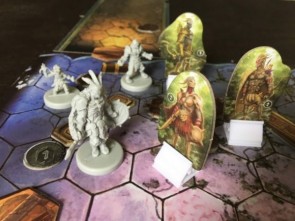Hannibal: Rome vs Carthage provided one of the most memorable gaming sessions of my life. Since the mid game, my Carthaginian armies had dominated the board thanks to a blend of luck and skill. In the final turn, Rome's only hope was an instant victory by taking Carthage itself. He duly built a big invasion stack and in response, I drew forces back to protect Africa.
But on the point of launching this assault, he did something different instead. He moved several smaller stacks along the coasts, dropping units as they went. To my horror, I realised what he was doing was cutting off all the supply lines to my control of Spain and Italy. He'd distracted my attention to Africa with a brilliant feint and used it to win the game of the very last round. It was a staggering feat of planning and strategy which has stayed with me for years.
Moments like that are rare, but they're what I game for. When I first got into gaming as a teen, I imagined myself as a proxy Sun-Tzu, measuring my skills against my opponents. And like Sun-Tzu, the I took pleasure in seeing how competition was an art. A creative endeavour where a cunning player could use all the tools at their disposal to invent new and unexpected ways to do things. That's the life-blood of gaming, the human element that keeps things endlessly fresh and exciting.
So why, then, would you actively seek to remove that from your games?
That's what co-op games do. They have no human element to surprise the players. So instead they fall back on ploys to create the illusion of surprise. Big decks of cards are the most popular but you often see dice, modular boards, story paragraphs and all that sort of thing. This is fine for games about narrative. And some co-op games like Escape the Dark Castle take that route and work fine for a while. But even then, there's a limit. It's not long before you've seen the whole deck, read all the paragraphs and the game loses its shine.
The lance for that boil is to add some strategy. It's why a lot of gamers have come to prefer mechanical puzzles over more thematic fare. But we instantly hit a problem. Because the solution most co-ops have for the lack of surprise is to substitute lots of randomness. And lots of randomness is, of course, anathema to strategy.
Getting around this requires another conjuring trick, as fake as the initial one, which is to disguise depth with difficulty. If a game has lots of mechanical levers and is hard to beat, it might fool a lot of players into thinking it has depth. That resetting the puzzle and applying lessons learned over and over again will lead to improvement and success. This kind of incremental feedback is addictive and fun: it powers a lot of online digital games. But they have a luxury tabletop doesn't, of being able to hide shared information.
Without that, the repeat plays will eventually lead to a win. But while that might feel like improvement, it's a sham. All that's happened is that the group happened on a game state that made it easier for them to gain victory. The ever-popular progenitor of the co-op craze, Pandemic, is a great example. The initial shuffle does its best to give an even distribution of Outbreak cards in the deck. But if two are too close together, it almost doesn't matter what you do. The game is likely lost before anyone takes a turn. Likewise, if there's a good space between the first two, most groups will win unless they really screw up.
Of course, everyone wants to stop that happening. Which leads to the final and most serious problem with the genre. You can tell how widespread it is by the number of labels it has: quarterbacking, boss player, alpha dog and many others. The group wants to win, so it defers decision making to the best or loudest player. Despite the name of the genre, this is almost the diametric opposite of co-operation. There's no discussion, no creation, no group cohesion of finding a shared way forward. Only a herd of sheeples, following the glorious leader.
It's easy, and unhelpful, to criticise. And these problems are not insurmountable. There are a small number of co-operative games which rise about the issues. And when they do the results are startling and brilliant. They foster real co-operation, offer a thrilling and novel challenge on every play. And with it a unique and memorable gaming experience.
Successful co-op games have one of two things in common. The first is a spatial element with some kind of enemy AI routine. This works because of the way simple elements combined together can explode in exponential complexity. Opposing pieces moving around the board makes the game feel alive in a way that manipulating numbers and tokens can't. And the unpredictable way in which everything interacts makes it hard for an alpha player to predict. On their own turn, a player has the chance to try to make their own sense of the game state and make independent decisions.
The other common factor is some method to stop the players from communicating clearly. Giving players hidden information and then forbidding them from sharing it is the easiest example. But you can go a lot further. In Hanabi, for instance, it becomes the basis of the entire game, in which players must make optimisation decisions based on what clues they can give. Groups playing Hanabi seem to develop an ability to read one another's body language in an act of close and genuine co-operative play.
We can't close out this piece without mentioning Gloomhaven which does both of the above, and to an extreme degree. In doing so it becomes the best co-op, and indeed one of the very best games, ever designed. It got that way because the designer paid close attention to the inherent problems in co-ops and invented brilliant solutions.
But back when the genre was new and shiny and every designer on the block wanted a piece, no-one cared. Their efforts quickly grew stale and boring yet the consumer cult of the new ensured they sold and gamers demanded more. So they got more, of the same, with the same problems that allowed the genre to swell with undeserved popularity. We deserve better. Gloomhaven has the potential for surprise and thrills every bit the equal of Hannibal. It's about time we demanded nothing less of every co-op title.
 Games
Games How to resolve AdBlock issue?
How to resolve AdBlock issue? 































